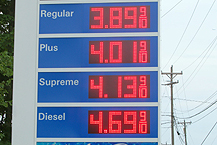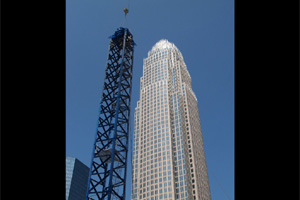Vice Versa
Will increasing energy prices change the American way of life?

Dany Claeys is correspondent in Charlotte, NC for myAmerica.be. About 25 years ago he moved to the United States. Says Dany: "During all my years in the USA, I always managed Belgian owned companies (Barco and Agfa) and acted as a bridge between Belgian and American cultures."
The American comfortable life style always assumed an abundance of low cost energy and gas. Comfort in the US means driving around in big luxury loaded spacious cars, living in large homes with several extra bonus rooms in the distant suburbs, driving to work in downtown or to the kid’s soccer practice across town or to the clustered shopping centers in the city outskirts, while always protected from the weather elements in the right air conditioned temperature in the house, car, office, restaurant and shopping mall.
$4.01 per gallon
The average American does not follow the daily price fluctuation of the crude oil price, which recently broke the $130 per barrel level. (How many gallons are in a barrel anyway? 42…). However when the big signs at the ubiquitous gas stations suddenly show numbers over $4 per gallon (3.78 liters) and a full tank of gas starts to run in the $70-80 range, it finally hit home that the time of cheap gas and energy might be over. Remember less than 10 years ago, it took only $20 to fill up. When you then point out the gas prices in Europe are approaching $9 per gallon, which translates in $150 for a average tank of gas, one notices a glazed and scared look in their eyes and comments like “that will never happen here”
Are small cars safe?
Over the last decades all car manufacturers have done a superb job in marketing simple messages. To protect your precious family, your car simply needs to be bigger than the other and to enjoy the great American outdoor in comfort, you need cargo space to take everything imaginable with you and you need a powerful V6 or V8 for ample torque power to pull the boat or camper to the lake or the mountain cabin. This vicious circle has created gas guzzling behemoth cars with rugged names as Navigator, Denali, Yukon, Sequoia, Tahoe and Hummer. Can you imagine doing all this in a small 4 cylinder euro sedan? For many, the answer is no, and they just count on the car producers to come up quickly with new technology to increase the mileage. Gas consumption here is expressed in miles per gallon and not in how many liters are consumed per 100 km. (big SUV’s hardly get only 15 mpg (16l/100km), smaller SUV’s average 20 mpg (12l/100mk) and anything over 25 mpg (9.5l/100km) is considered great mileage over here.
Empty HOV lanes
Over the last decades, many city traffic managers came up with the luminous idea of HOV lanes (High Occupancy Vehicles), also known as express lanes in some cities, to resolve traffic jams during rush hour. Many cities already gave up on these, as these lanes remain deserted, as even the avoidance of traffic jams could not convince enough Americans to give up their individual freedom of each riding their own car. Now one would think that rising gas prices would motivate to start carpools, however these are still rare, as the idea of not having your own wheels at your disposal at any time is conflicting with the idea of personal freedom for many people.
The battle of the office thermostat
After having spent over two decades in US offices of Belgian owned companies, I had given up already for a long time of trying to convince Americans to turn off the lights in unused offices or power down their computer and other office equipment at night. I never understood the logic why in summer the office thermostat got turned down to 68F and in winters up to 75F. After I once tried to put locks on the thermostats and put them on European accepted temperatures of 66F in winter and 75F in summer, my ever assertive HR Manager reminded me very clearly I was in America and not in Belgium and so I adapted by bringing my sweater to the office in the summer and wearing summer shirts in the office in the winter… It still amazes me how people in our office turn on the heat in the morning and then turn on the air in the afternoon, not to speak of the individuals who have a heater or fan running under his desk to get that perfect temperature for their selves.
Cathedral ceilings
As we moved around a few times in the US, we had the pleasure of meeting some interesting real estate agents, showing us a great variety of nice homes. Being energy conscious, we always flabbergasted the real estate agent with questions about double or triple pane windows, wall insulation, energy efficient appliances, programmable thermostats for night and day temperatures, R factor and average monthly energy bill. They became even more desperate, when we did not seemed to appreciate the glamour and beauty of energy consuming cathedral ceilings in the master bedroom and palatial double height entry hallways. We now live in a comfortable condo with double paned windows, insulated walls and programmable thermostat, energy efficient appliances and a heat pump based heating system. And yes we only turn down the air conditioning in the bedroom to guarantee a good night of rest, and turn on lights only in the room we use and power off all electronics off, when not in use.
Are the changes in behavior temporary or permanent?
We are pleased to report we are noticing some initial changes in behavior. Not that Americans suddenly became energy conscious, but energy prices are hurting their pocket book and create a hole in their weekly spending budget. Sales of large SUV’s and Trucks are dropping with more than 30%. Car ads are displaying the mpg rate, at least on the smaller and gas efficient cars. People are buying hybrid cars and are even considering the new bluetec diesel engines. They plan their multiple shopping trips better and rider ship on the scarcely available public transportation is even up a bit. Home builders do not talk about cathedral ceilings anymore, but advertise energy insulation and energy efficient appliances. Politicians in our city are even preparing a bill to enforce a minimum number of trees on the huge parking lots to provide shade for the cars. We are also pleased to notice some changes in urban development. Finally we see some complete villages appear at the outskirts of the city with a good mix of apartments, condos, homes and offices and in walking distance of stores, schools, restaurants, coffee shops, gym and medical services with tree lines streets and shaded side walks and finally bike paths.
Is it habit or addiction or the pocket book?
In the office however, I have tried to move the thermostat to no avail and ditto for car pooling. Restaurants and shopping malls continue to overheat in winter and freeze in the summers. I guess employees are less concerned about their employer’s pocket book and are not yet prepared to give up the freedom of having their own wheels always available and restaurant and store owners are afraid of scaring away their customers. These encouraging initial behavior changes will become only permanent, if energy prices continue to increase. The only way to change the energy behavior (or is it addiction?) in America is to hit their pocket book or the company’s bottom line.
Pray at the Pump
Awareness campaigns on global warming, carbon prints, energy (and water) consumption have only had limited results so far. If energy prices would ease up a bit in a few months, I am afraid that most Americans will get back into their old habits and only give up some excessive energy wasters like behemoth SUV’s, hour long commutes, huge double height entry halls, heated outdoor pools and air conditioned restaurant outdoor patio’s. And at the end, if the politicians can not decrease the gas prices, then one can always join the movement “Pray at the Pump”, a movement headed by Atlantan Rocky Twyman who holds group prayers at gas stations around the country asking God for cheap gas.
Recently on Vice Versa
Naar de tandarts ... A Visit to the Dentist...
 Ken Coppieters is a Belgian scientist working at The La Jolla Institute for Allergy and Immunology and lives with his wife Helena in San Diego, California. He is a regular contributor to this web site.
Ken Coppieters is a Belgian scientist working at The La Jolla Institute for Allergy and Immunology and lives with his wife Helena in San Diego, California. He is a regular contributor to this web site.
In this article he writes about the issue of medical/dental insurance and cost in the United States.
We feel at home in Charlotte, North Carolina...
 Dany Claeys is correspondent in Charlotte, NC for myAmerica.be. About 25 years ago he moved to the United States. Says Dany: "During all my years in the USA, I always managed Belgian owned companies (Barco and Agfa) and acted as a bridge between Belgian and American cultures."
Dany Claeys is correspondent in Charlotte, NC for myAmerica.be. About 25 years ago he moved to the United States. Says Dany: "During all my years in the USA, I always managed Belgian owned companies (Barco and Agfa) and acted as a bridge between Belgian and American cultures."
English (via Google)
Op zoek naar gulle schenkers - Looking for generous donors
 Ken Coppieters is a Belgian scientist working at The La Jolla Institute for Allergy and Immunology and lives with his wife Helena in San Diego, California. He is a regular contributor to this web site. In this article he writes about his visit to Stanford University and the importance of networking within the academic community.
Ken Coppieters is a Belgian scientist working at The La Jolla Institute for Allergy and Immunology and lives with his wife Helena in San Diego, California. He is a regular contributor to this web site. In this article he writes about his visit to Stanford University and the importance of networking within the academic community.
English (via Google)
Een belangrijk deel van de financiering van biomedisch onderzoek in de V.S. wordt voorzien door de National Institutes of Health (N.I.H.), enigszins vergelijkbaar met het Fonds voor Wetenschappelijk Onderzoek (F.W.O) in Belgie, maar dan enkele maatjes groter uiteraard...